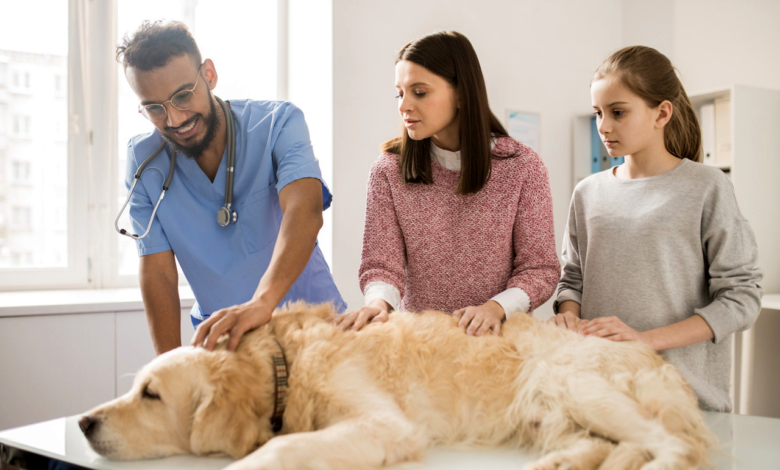
Importance of Regular Pet Checkups: Preventing Health Issues
Pet ownership brings immense joy and companionship, accompanied by a crucial responsibility – ensuring the well-being of our furry friends. In the realm of pet care, one of the fundamental pillars is the routine checkup. This article delves into the pivotal role of regular pet checkups in preventing health issues, elucidating the significance of proactive measures for the overall health and happiness of our beloved companions.
Read More: Understanding Pet Obesity: Identifying Risks and Managing Weight
Understanding Preventive Pet Care

Preventive care is the proactive approach to maintaining a pet’s health, aiming to identify and address potential issues before they become major concerns. Regular checkups serve as the linchpin of preventive care, offering veterinarians the opportunity to discern subtle signs of illness early on. This proactive strategy not only contributes to a longer and healthier life for pets but also alleviates the emotional and financial burden on pet owners associated with treating advanced illnesses.
Common Health Issues in Pets
Pets, like humans, can be susceptible to a range of health issues, spanning from dental problems to chronic diseases. Regular checkups provide a window for veterinarians to comprehensively assess a pet’s overall health, detecting and addressing developing issues in their nascent stages. From allergies to joint problems, the early detection facilitated by routine checkups prevents these issues from escalating into more severe and challenging-to-treat conditions.
Benefits of Regular Checkups
The benefits of regular pet checkups extend far beyond early detection. These visits contribute to a pet’s overall well-being by addressing various aspects of their health, including nutrition, vaccinations, dental care, and mental health. Investing in preventive care not only enhances a pet’s quality of life but also translates into substantial cost savings for pet owners, sparing them from the financial strain associated with extensive treatments for advanced illnesses.
Building a Relationship with Your Vet
Establishing a robust bond between pet owners and veterinarians is paramount for effective preventive care. Regular checkups foster this relationship, allowing veterinarians to understand the unique needs of each pet. This collaborative approach enables pet owners to seek advice on various aspects of pet care, ensuring comprehensive and personalized attention for their furry companions.
Nutrition and Preventive Health
Nutrition stands as a cornerstone of preventive pet care. A well-balanced diet tailored to a pet’s specific needs can prevent obesity, allergies, and other health issues. During regular checkups, veterinarians provide guidance on dietary requirements, ensuring that pets receive the nutrition essential for their overall health and vitality.
Vaccinations and Immunizations
Timely vaccinations are critical in preventing infectious diseases that can pose a threat to a pet’s health. Regular checkups include assessing a pet’s vaccination status and administering any necessary immunizations. This proactive measure safeguards pets from potentially life-threatening illnesses and contributes to the overall well-being of the pet community.
Dental Care for Pets

Dental health, often underestimated, plays a significant role in a pet’s overall well-being. Regular dental checkups can prevent issues such as gum disease and tooth decay. Pet owners can also receive guidance on at-home dental care practices, ensuring that their pets maintain healthy teeth and gums throughout their lives.
Exercise and Mental Well-being
Regular exercise is essential for preventing obesity and promoting mental well-being in pets. During checkups, veterinarians can discuss the importance of physical activity tailored to a pet’s breed, age, and health condition. This personalized advice empowers pet owners to create an environment that supports their pet’s physical and mental health.
Pet Checkup Frequency
Determining how often a pet should undergo checkups depends on various factors, including age, breed, and existing health conditions. While younger pets may benefit from more frequent visits, older pets or those with chronic conditions may require additional attention. Consulting with a veterinarian helps establish an appropriate schedule for regular checkups.
Challenges in Implementing Preventive Care
Despite recognizing the importance of preventive care, pet owners may face challenges in prioritizing it. Time constraints, financial concerns, or a lack of awareness can hinder the consistent implementation of preventive measures. Overcoming these challenges involves education, financial planning, and the recognition that preventive care is an investment in a pet’s long-term health and happiness.
Pet Insurance and Preventive Care
Pet insurance emerges as a valuable ally in the journey of preventive care. By providing financial coverage for routine checkups, vaccinations, and unexpected health issues, pet insurance encourages pet owners to stay committed to their pet’s preventive care regimen. It offers peace of mind, knowing that financial constraints will not compromise a pet’s access to necessary healthcare.
DIY At-Home Health Checks
In addition to professional checkups, at-home health checks empower pet owners to monitor their pets’ well-being actively. Regularly checking for signs of discomfort, changes in behavior, or abnormalities in a pet’s physical appearance allows for early detection of potential health issues. These simple yet effective checks complement the thorough assessments performed by veterinarians.
Testimonials and Success Stories

Real-life testimonials from pet owners who have embraced regular checkups and preventive care provide powerful anecdotes. These stories showcase the positive impact of preventive measures on a pet’s life, reinforcing the importance of proactive health management. From preventing serious illnesses to enhancing overall happiness, these testimonials underscore the value of regular pet checkups.
Conclusion on Regular Pet Checkups
In conclusion, the importance of regular pet checkups cannot be overstated. Preventing health issues through proactive measures ensures not only a longer and healthier life for pets but also strengthens the bond between pet owners and their furry companions. By addressing nutrition, vaccinations, dental care, and mental well-being, regular checkups pave the way for a fulfilling and joyful life for our pets.
Read More: The Importance of Regular Veterinary Checkups
FAQs:
- How often should I take my pet for a checkup? The frequency of checkups depends on factors like age, breed, and health conditions. Consult with your veterinarian for personalized advice.
- Is pet insurance necessary for preventive care? While not mandatory, pet insurance can provide financial support for routine checkups and unexpected health issues, encouraging consistent preventive care.
- Are at-home health checks sufficient? At-home checks complement professional assessments but should not replace them. Regular veterinary checkups remain crucial for a comprehensive health evaluation.
- What role does nutrition play in preventive pet care? Proper nutrition is key to preventing obesity and addressing various health issues. Consult with your vet to create a balanced diet suitable for your pet.
- Can preventive care save money in the long run? Yes, investing in preventive care can lead to significant cost savings by avoiding the need for extensive treatments for advanced illnesses.








One Comment